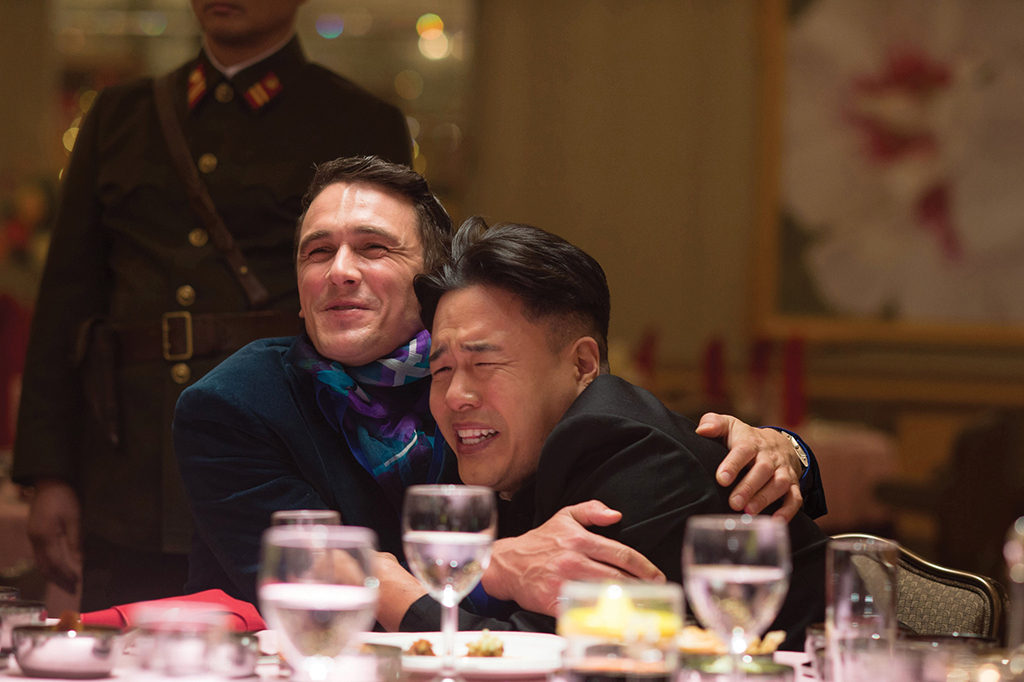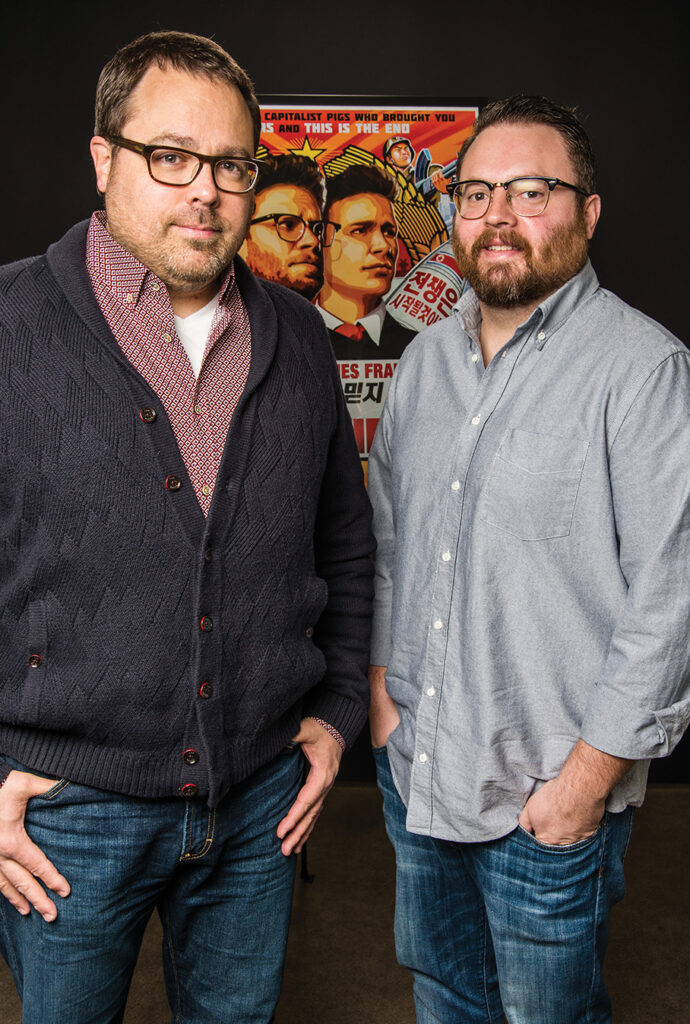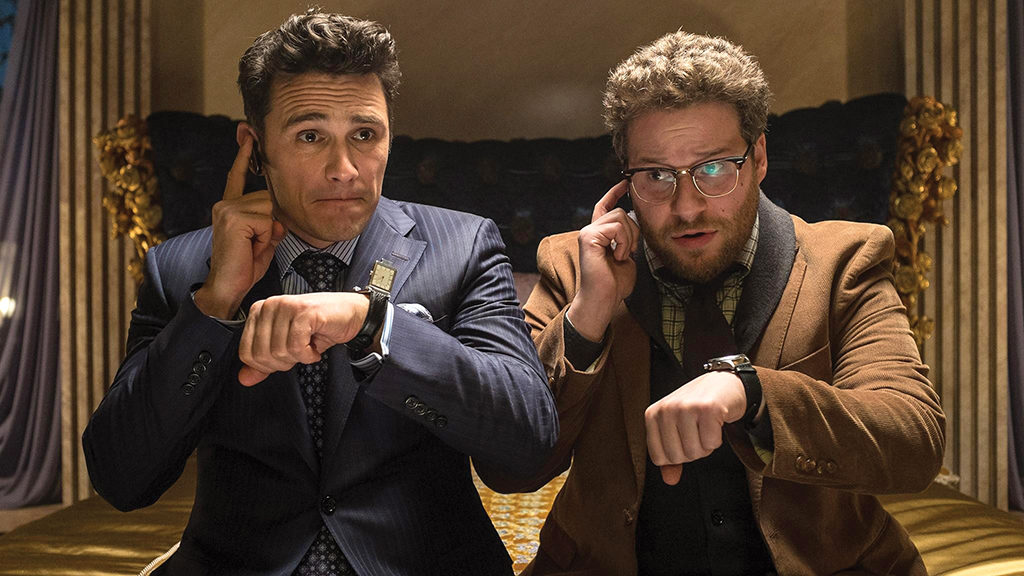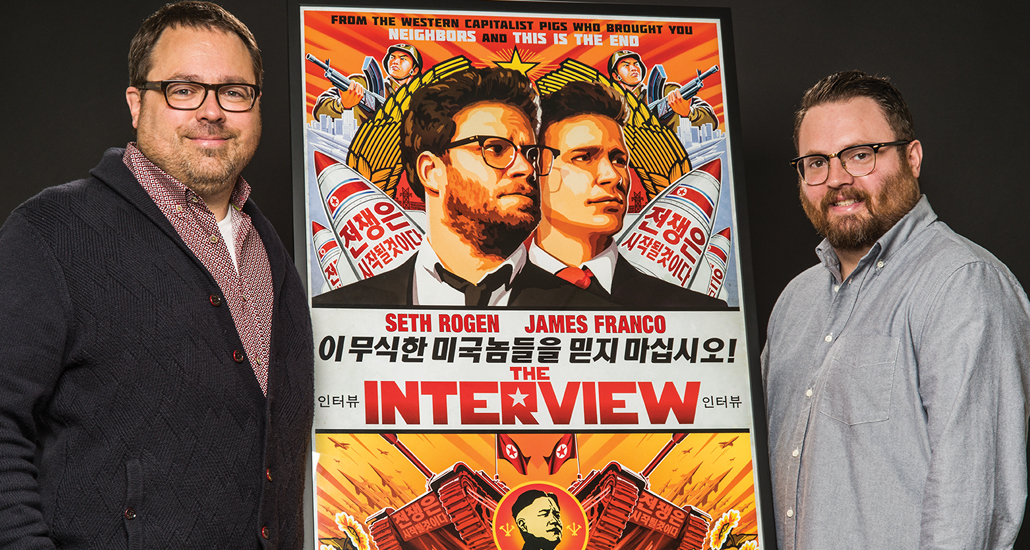by A.J. Catoline
Film editing may be known as “the invisible art,” but picture editors Zene Baker and Evan Henke never expected that all their work cutting The Interview was in danger of becoming invisible itself.
As everyone in the industry is well aware, Columbia Pictures’ The Interview was the cause célèbre of the just-passed holiday season — yet no one in the press writing ad nauseam about the hot-button movie ever got around to asking the editors for comment. Until now. And contrary to popular perception, the editors say they were not forced to make changes to the film in the cutting room for political reasons before its limited release in theaters and by digital video-on-demand in late December.
“There was absolutely no censorship on the movie in editorial,” claims picture editor Zene Baker in a recent exclusive interview with CineMontage. “We knew that there would always be controversy, but there never was a moment when anyone said, ‘We need to scale this back,’ or ‘You have to cut this down,’ ‘You have to take this joke out,’ ‘That’s too offensive’ — none of that happened.’”
Baker and co-editor Henke gave separate interviews to CineMontage on their role in editing the film, a screwball comedy directed by Seth Rogen and Evan Goldberg that depicts the fictional assassination of North Korean leader Kim Jong-un.
This grim chapter in Hollywood history ensued in December, when Sony Pictures Entertainment made the last-minute and unprecedented announcement to pull the film from theatrical release, with no further plan for its distribution, after the studio’s computer system had been hacked and the hackers later threatened 9/11-style violence in cinemas that screened the film, causing the country’s four largest theatre chains to decline to show The Interview.
After online outrage about the decision, as well as sharp criticism of Sony by free-speech advocates, Hollywood stars and even the White House, the studio ultimately relented, making the film available for digital streaming and download on Christmas Eve, and releasing it in some 300 independent theaters on Christmas Day.

Dave Skylark (James Franco) and Kim Jong-un (Randall Park) in The Interview. Courtesy Columbia Pictures.
“I’ve been on ‘special’ or controversial films before,” Henke explains. “I was on Inglourious Basterds [as first assistant editor]. But never has a film I’d worked on taken over the cultural landscape like this. Everyone is talking about this film — and it’s definitely broadened the conversation about North Korea.”
When news of The Interview moved off the arts page and onto the front page, and Sony suffered the domestic brickbats, Baker posted on the Editors Guild’s I am the Union Facebook page: “As the editor of this film, I’m very disappointed…could not be more proud of this project. This feels like a horrible precedent.” And he tweeted: “Definitely happy to have made a great film [that] people can’t see, rather than crap no one wants to see. #FreeTheInterview.”

Zene Baker, ACE and Evan Henke. Photo by Wm Stetz.
“It’s a silly, fun movie,” Baker says. “It’s satire, but it’s dumb satire.” Henke adds, “It’s a goofball comedy. And when you tell people they can’t see something, they want to see it more.” To his point, a cinema in England was sued by Warner Bros. (and lost) for having an unauthorized screening of A Clockwork Orange, after it was pulled from distribution in the UK (at director Stanley Kubrick’s urging, after his family received threats) in 1972.
Now about those changes to the film… Internet rumors and leaked e-mails that were stolen suggested that nervous Sony executives at its headquarters in Tokyo — within missile range of North Korea — ordered jokes about Kim Jong-un to be edited out. And tabloids reported a so-called gay orgy scene was cut from The Interview.
“That [orgy] sequence never made it to principal photography,” Baker counters. “The scene never existed other than in the draft of the script that got leaked.”
There were visual effects changes to the film, however. The death scene of Kim being blown up in the helicopter was toned down, the editors report. Visual effects supervisor Paul Linden revised the shot so the explosion does not “melt Kim’s face off, like the villain in Raiders of the Lost Ark,” Baker explains.
However, this was not censorship, but a creative choice by the filmmakers, the editors are quick to point out. Kim, as played by Randall Park, became quite a charming and likable dictator, and having him die in a violent blaze would have been gratuitous. “It’s a weird irony,” comments Baker. “Everyone in the movie is an idiot, but Kim Jong-un is the smartest guy in the room.”
“We were concerned,” Henke concedes. “Had we made one of the most evil men on the planet too likable? He is a horrible person, but in our movie, we wanted him to be the butt of jokes.” The editors say they struck a balance in cutting the film, to make the Kim character “funny, but to also look like the bad guy he is,” Henke says. It is, after all, just a comedy.
Stressing that point, Baker, posting again on the I am the Union Facebook page Christmas Eve, encouraged fellow Guild members to “Go out and see The Interview in a theatre full of people. Laughter is contagious.”
“I encouraged people to see it in theaters because that’s how we crafted the film,” the editor offers, explaining that test screenings recorded the audience reaction, which was synched to the picture edit. “We used the laugh track so we could boost laughs and get a laugh roll going. And if people aren’t laughing, we tighten the pace of it.”
Coincidentally, the 2004 film Team America: World Police, with a cast of puppets, mocked Kim Jong-il, the father of the current North Korean dictator, and included a song with the lyrics “we’re gonna need a montage.” And Baker and Henke definitely needed several cleverly edited montages to get The Interview down to a 112-minute running time.
“The travel montage, the trip to China, was beautiful and fun to cut,” says Henke. “That whole montage is a setup to a joke. TV producer Aaron Rappaport [Rogen] travels all that way for a two-minute meeting and speech” with the North Korean General Sook (Diana Bang).
In all of Rogen’s movies there is a party montage, which originally was a full day’s worth of footage, according to Baker. The film’s additional editor Michael Webber — Baker’s assistant since Observe and Report in 2009 — had the idea to use every shot and angle in a flash of cuts. “I got to do much more than the average assistant editor, yet avoided much of the political pressure of the guy in the chair,” says Webber. “I got to be very creative, and Zene and Evan allow creative collaboration. Zene is all about mentoring his assistants and giving them opportunities to move up.”

James Franco and Seth Rogen as undercover agents in The Interview. Courtesy Columbia Pictures/SONY
Baker is a veteran editor of four Rogen- starring films, including Neighbors (2014) and This Is the End (2013), the latter of which Rogen directed. Of all, The Interview by far had the most footage. “For the written script, they chose one path, but had those other paths ready to try,” he says. The picture logged up to 400 hours of footage, and the final interview scene between Kim and TV tabloid journalist Dave Skylark (James Franco) was 70 hours shot across many cameras, with at least 12 hours of scene material, according to the editors. The producers knew they needed the help of another editor to help cut the off-script material, which is when Henke was brought onto the film.
“Zene said, ‘Jump in!’” Henke recalls. “‘Why don’t you take a stab at reel one, and I will take a stab at reel two?’ Rogen and Goldberg could go into Zene’s room, work for three hours and give him notes, then come over to me and work on a different reel. We trusted each other.”
About co-editing, Baker adds, “I’m not an editor who’s protective about my stuff. Yes, I cut things the way I want, and there’s a good reason I cut them that way. But if you come up with something better, I’m not ashamed or afraid to admit you topped me. And it makes the product better.” His philosophy is that there is no room for ego when collaborating with other editors. “We are all in a really magical business where we get to facilitate entertaining people,” Baker says.
The Interview contains a pertinent visual gag for editors. In the climactic scene, a fight breaks out in the control room with Rappaport battling an angry, finger-biting, North Korean video-tech operator (presumably non-union) who wants to cut the live feed. As they are wrestling over the video switcher, they bump the controls that cause the camera switching to go haywire, and Rappaport is screaming not only in defense of his life but to make sure Sook gets to the controls in time to “switch to Camera 3!” Then a button is pushed that triggers a series of star wipes — the editor’s most obnoxious possible transition!
The film may be a goofball comedy, but it does have its moments where some messages get through, along with some inside jokes for those of us in post-production. Winning the battle at the end, Rappaport shouts, “Don’t f *ck with my angles!” At least he is standing up for the rights of all editors and technical directors.


